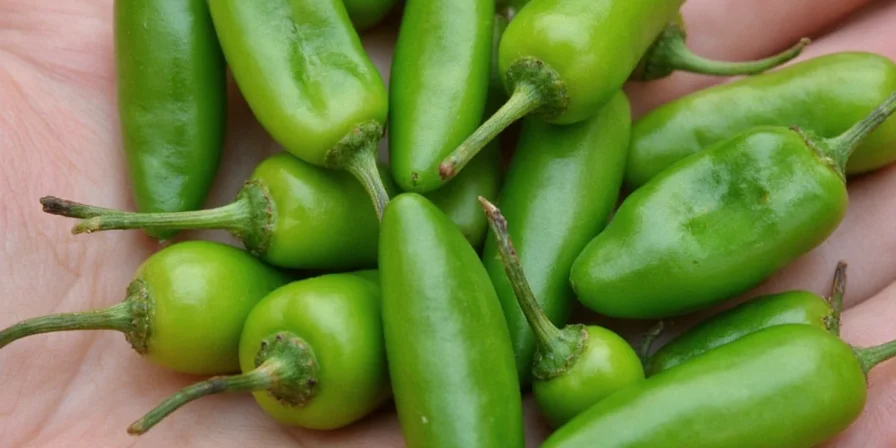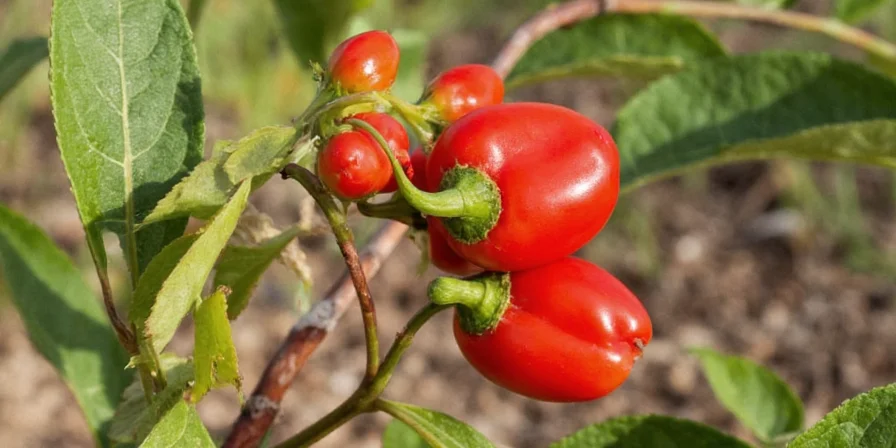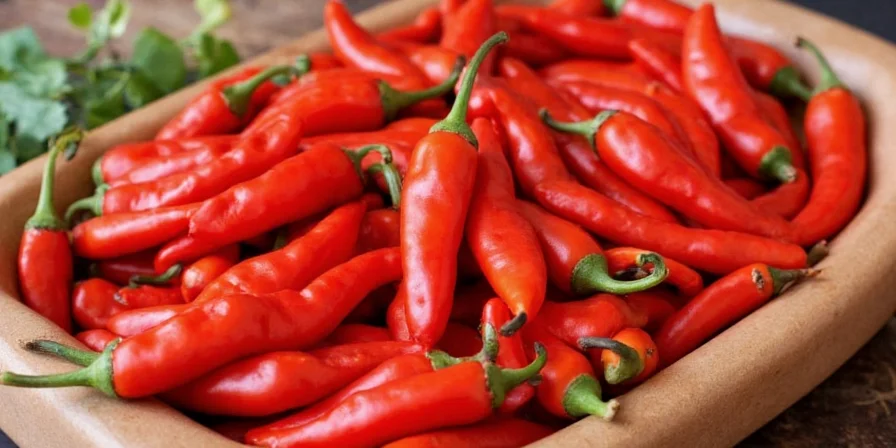
Table of Contents
- Quick Facts Cheat Sheet
- What Are Bird's Eye Chilies? (Simple Explanation)
- Exactly How Hot Are They? (With Real Comparisons)
- Best Substitutes When You Can't Find Them
- What Do They Actually Taste Like?
- Practical Cooking Uses (Home Kitchen Version)
- Safe Handling Tips That Actually Work
- How to Store Properly (Refrigerator vs Freezer)
- 3 Simple Recipes Anyone Can Make
- The Science Behind the Heat (For Curious Cooks)
- Most Asked Questions Answered
Bird's Eye Chili Quick Reference Guide
Get immediate answers before diving deeper:
- Heat Level: 50,000-100,000 Scoville units (5-10x hotter than jalapeños)
- Best Substitute: Thai chilies or serranos (use 2x amount)
- Heat Control Tip: Remove white membranes for 70% less heat
- Where to Buy: Asian grocery stores, some supermarkets (check international aisle)
- Storage Life: 2 weeks in fridge, 6 months frozen

What Are Bird's Eye Chilies? (Simple Explanation)
Bird's eye chilies are small, potent peppers (1-2 inches long) commonly used in Southeast Asian cooking. Despite their tiny size, they pack serious heat - significantly hotter than jalapeños you're familiar with. These chilies turn from green to bright red as they ripen, with the red version being noticeably hotter.
Exactly How Hot Are Bird's Eye Chilies? (Real-World Comparisons)
Forget confusing Scoville numbers - here's what the heat means in your kitchen:
| Pepper Type | Real-World Comparison | How Much to Use |
|---|---|---|
| Bird's Eye Chili | Like 5 jalapeños in one tiny pepper | Start with 1/2 pepper per dish |
| Jalapeño | Familiar supermarket pepper | 1-2 per dish |
| Habanero | Fruitier but longer-lasting heat | 1/4 pepper per dish |
The key difference: bird's eye chilies release their heat immediately when cooking, unlike jalapeños that need time to infuse. This is why Thai chefs add them at the very end of cooking.

Best Bird's Eye Chili Substitutes (When You Can't Find Them)
Don't cancel your Thai recipe! These work in a pinch:
- Serrano peppers: Use 2 serranos for every 1 bird's eye chili (remove seeds for less heat)
- Thai chilies: Nearly identical (check Asian markets)
- Cayenne powder: 1/8 teaspoon cayenne = 1 whole bird's eye chili
- Red pepper flakes: Start with 1/4 teaspoon and adjust (less precise but works)
Important: Never substitute habaneros one-to-one - they have different heat patterns that will ruin your dish's flavor balance.
What Do Bird's Eye Chilies Actually Taste Like?
Beyond just heat, they offer distinct flavors:
- Green (unripe): Sharp, grassy notes that cut through rich dishes
- Red (ripe): Bright, citrusy flavor that complements seafood and vegetables
This is why they're essential in Thai cuisine - they add both heat and bright flavor that larger peppers can't match.
Practical Cooking Uses (Home Kitchen Version)
Professional techniques adapted for home cooking:
- Stir-fries: Add 1 sliced chili during the last 60 seconds of cooking
- Soups/Curries: Add whole chili 2 minutes before finishing (remove before serving)
- Sauces: Blend 1 chili with 2 tbsp lime juice and 1 tsp sugar for perfect balance
- Heat adjustment: Remove white membrane for milder heat (contains 90% of capsaicin)
- Infused oil: Steep 3 chilies in 1/4 cup oil for 24 hours (store in fridge)
Safe Handling Tips That Actually Work
Avoid burning your skin or eyes with these proven methods:
- Gloves: Use nitrile gloves (latex doesn't protect well)
- Cut safely: Slice away from your body on a dedicated cutting board
- Accidental contact: Wash with rubbing alcohol first, THEN water (water spreads the oil)
- Eye exposure: Flush with cold milk (not water) - casein binds the capsaicin
- Cleanup: Wash all surfaces with soapy water immediately
How to Store Bird's Eye Chilies Properly
Extend freshness with these methods:
- Fridge storage: Place in perforated bag with damp paper towel (2 weeks)
- Freezing: Freeze whole on baking sheet, then transfer to container (6 months)
- Drying: String chilies and hang in dry area (2-3 weeks until brittle)
- Never: Store in airtight containers while fresh (traps moisture)
3 Simple Bird's Eye Chili Recipes Anyone Can Make
- 5-Minute Thai Dipping Sauce: Combine 1 minced chili, 2 tbsp fish sauce, 1 tbsp lime juice, 1 tsp sugar, 1 minced garlic clove
- Quick Spicy Noodles: Toss cooked noodles with 1/2 sliced chili, 1 tbsp soy sauce, 1 tsp sesame oil
- Easy Chili Oil: Heat 1/2 cup oil with 5 whole chilies on low for 10 minutes, cool and store
The Science Behind the Heat (For Curious Cooks)
Why these tiny peppers pack such a punch:
Bird's eye chilies have a special structure - their small size means more skin relative to flesh, and the heat compound (capsaicin) concentrates in the white membrane. Unlike larger peppers, their capsaicin dissolves quickly in liquids, which is why they deliver immediate heat rather than gradual warming.
| Chili Type | Heat Release in Soup | Heat Release in Oil |
|---|---|---|
| Bird's Eye | Immediate (2-3 minutes) | Moderate (5-7 minutes) |
| Habanero | Slow (10+ minutes) | Very Strong (8+ minutes) |
| Serrano | Moderate (5 minutes) | Moderate (6 minutes) |
Most Asked Questions Answered
How many jalapeños equal one bird's eye chili?
One bird's eye chili equals approximately 5-10 jalapeños in heat intensity. Start with 1/2 bird's eye chili when substituting for 1 jalapeño, then adjust to taste.
Why are they called 'bird's eye' chilies?
They're named for their small size and shape, which birds can easily swallow and disperse through their droppings. Birds aren't affected by capsaicin, making them perfect natural distributors.
What to do if you've added too much bird's eye chili?
Add acid (lemon juice or vinegar) - 1 tsp per serving reduces heat by about 30%. Dairy like coconut milk also helps (1/4 cup per serving). Sugar masks heat but doesn't neutralize it. Never add more chili to 'balance' the heat.
Green vs red bird's eye chilies - which should I use?
Green chilies have grassier, sharper heat ideal for meat dishes. Red chilies are fruitier and brighter, perfect for seafood and vegetable dishes. Red are typically 20-30% hotter than green versions of the same variety.
Can I grow bird's eye chilies at home?
Yes! They grow well in containers (minimum 12" pot). Need 6+ hours of sun daily. Start seeds indoors 8 weeks before last frost. Harvest when chilies turn bright red. Container-grown plants produce for 2-3 years indoors.











 浙公网安备
33010002000092号
浙公网安备
33010002000092号 浙B2-20120091-4
浙B2-20120091-4